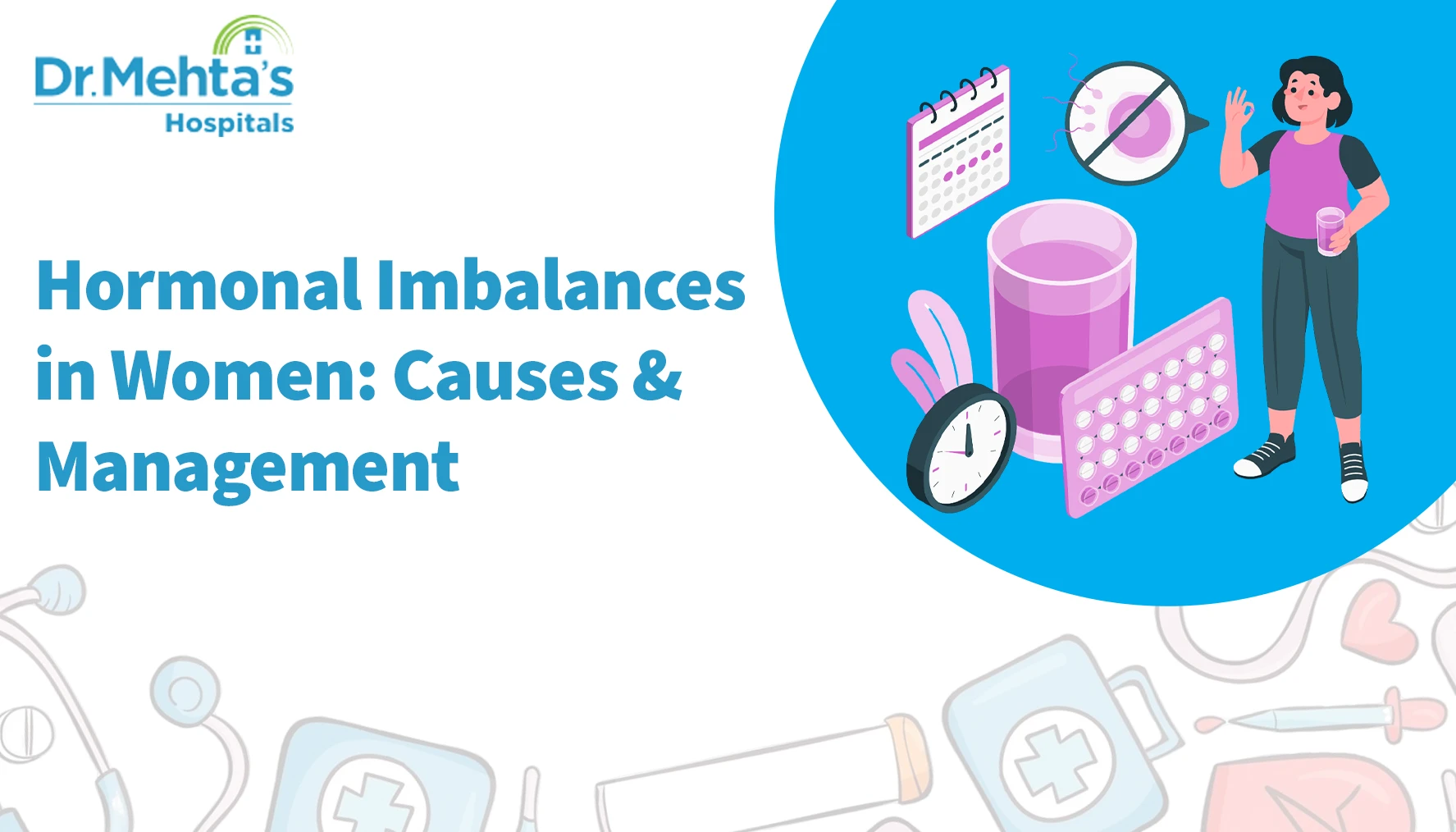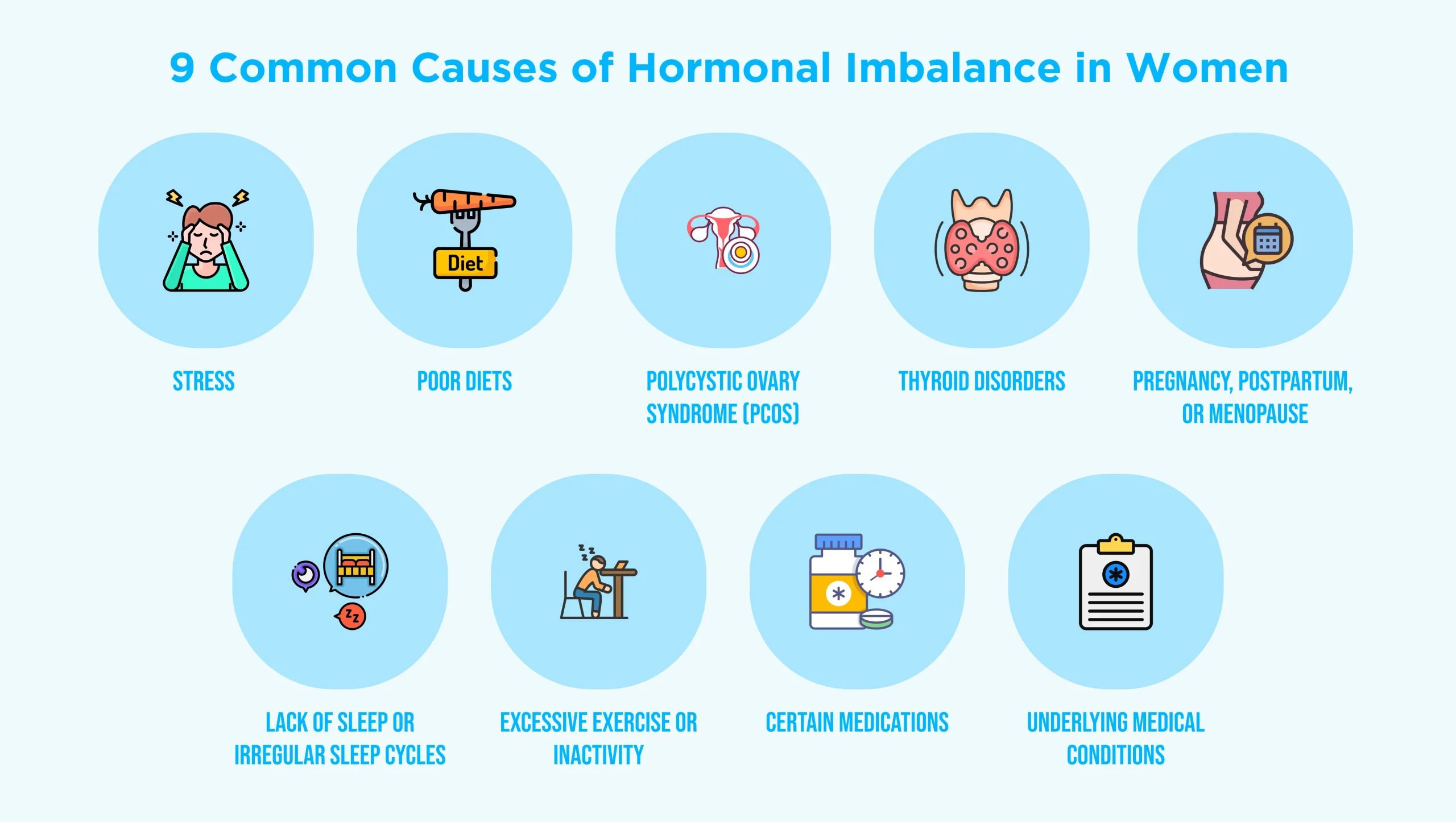Table of Contents

Hormonal imbalance in women is more common than many realize. Irregular periods, mood swings, skin issues, and other physical or emotional challenges often occur due to fluctuating hormone levels. The positive news is that most imbalances can be managed with timely medical guidance and healthy lifestyle choices.
Hormones are chemical signals that govern the most important body processes, such as metabolism, mood, reproduction, and development. Hormonal imbalance in women occurs when there is either too much or too little of a hormone in the blood. Even small changes in levels can trigger noticeable symptoms of hormonal imbalance in women.
According to a survey, menopause was reported amongst 1.5 percent of women before the age of 40. In women, hormones are important in:
Any disturbance in these delicate systems can impact daily life as well as long-term health.

Lifestyle and health influences can interfere with many hormones. Some of the causes are short-term and can be handled relatively simply, but others might require medical intervention. Knowing these triggers enables women to take proactive measures at the onset of unbalanced conditions to enhance general health.
One of the major causes of hormonal imbalance in women is stress. As the body is continuously pressured, the amount of cortisol increases. It can influence other hormones such as estrogen and progesterone, causing irregular periods, sleeping problems, or mood swings. Practices like yoga, meditation, and relaxation techniques can help manage stress effectively.
A high-sugar, processed food diet and unhealthy fats can interfere with insulin and thyroid hormones. Hormonal health may also be adversely affected by nutrient deficiencies, particularly of vitamins and minerals. Consumption of fresh fruits, vegetables, whole grains, and high-protein foods helps maintain hormonal balance and general wellness.
PCOS is one of the common diseases among women of reproductive age. In India, the number of women affected by PCOS differs across studies, with estimates ranging from about 4% to 22%. It develops when the ovaries secrete excess male hormone, causing irregular menstruation, acne, or weight gain. PCOS can be managed with medical care, diet, and lifestyle changes, enabling women to lead healthy lives. For specialised treatment, consulting an advanced gynaecology hospital in Chennai ensures the right support.
Hormonal fluctuations may be caused by both hypothyroidism (underactive thyroid) and hyperthyroidism (overactive thyroid). These conditions can influence energy levels, metabolism, and even menstrual cycles. Hormonal imbalance caused by thyroid issues can be managed with timely diagnosis and treatment from an endocrinologist.
Hormonal changes occur naturally during such life stages as pregnancy, postpartum recovery, and menopause. The changes can cause mood swings, hot flushes, or irregular periods. Although it is a normal process, medical advice, care, and support at the family level can facilitate this transition and ensure that women are comfortable.
Ineffective or irregular sleep interrupts the natural hormonal flow of the body, such as melatonin and cortisol. This can result in exhaustion and irritability as well as long-term hormonal disturbances. It is a good idea to prioritize 7-8 hours of good rest, as well as good sleep hygiene, to restore balance in the body. For persistent sleep-related hormonal issues, consulting an experienced gynaecology specialist in Velappanchavadi can provide safe and personalised care.
Hormone production is influenced by both excessive exercising and sedentary living. Excessive exercise can interfere with reproductive hormones, and inactivity can lead to insulin resistance. Moderate exercise like yoga, walking, or light exercises will keep hormonal balance.
Certain medications, such as contraceptives, steroids, or hormone-based drugs, can lead to changes in hormone levels. Although commonly taken to treat particular health conditions, it is essential to consult a doctor and have regular check-ups to monitor hormonal health. For sudden symptoms or urgent concerns, it’s important to seek immediate 24/7 medical care to ensure timely support.
Hormonal balance is frequently disrupted by chronic illnesses such as diabetes, obesity, or other endocrine diseases. Proper hormonal imbalance in women treatment, eating habits, and lifestyle changes for these health conditions not only enhance better health but also restore hormonal stability.
Here are some common symptoms of hormonal imbalance in women:
Alterations in the cycle length or missed cycles are commonly indicative of varying estrogen and progesterone concentrations in regard to reproductive well-being.
Acute gain or loss could show an imbalance of thyroid or insulin that affects metabolism and body energy.
Can a hormone imbalance cause hair loss in women? The answer is yes. A change in hormones, particularly androgens or thyroid, can make hair roots weak, and they may shed significantly.
Unregulated androgens or changing hormones cause the oil glands to get stimulated, causing acne, pimples, or irregular skin texture.
The imbalance of estrogen and cortisol may cause changes in mood, low levels of energy, and emotional swings that are related to stress.
Sudden body heat and sweating are common at menopause because changing estrogen levels disrupt body temperature.
Sleep cycles may be disturbed by imbalances in melatonin, cortisol, or estrogen, leading to restlessness and poor-quality sleep.
Hormonal problems left untreated can put one at risk of:
That is why early consultation with a leading endocrinologist or gynecologist in Chetpet is crucial.
So, how to control hormonal imbalance in women? Here are some effective treatments that you can try at home:
The issue of hormonal imbalances in women is widespread, yet it does not necessarily have to disrupt one’s life. Most women can take control of their health with the appropriate care, lifestyle balance, and medical assistance. If you’re seeking trusted healthcare support, you can always turn to one of the top multispeciality hospitals in Chennai for expert guidance and compassionate care. For concerns specifically related to women’s health, their obstetrics and gynecology department offers dedicated care tailored to every stage of life. To book an appointment, consult one of the top doctors or specialists in Chennai at Dr. Mehta’s Hospitals for tailored advice on your health needs.
Table of Contents
Recent Post
About us
Dr. Mehta’s Hospitals is a leading multispecialty hospital in Chennai with over 90 years of excellence. With 400+ beds and 80+ specialties, its Chetpet and Velappanchavadi centers offer advanced, state-of-the-art, compassionate care under one roof.
Chetpet Contact Details
Velappanchavadi Contact Details
Feel free to ask your queries on
Our Specialities
About us
Dr. Mehta’s Hospitals is a leading multispecialty hospital in Chennai with over 90 years of excellence. With 400+ beds and 80+ specialties, its Chetpet and Velappanchavadi centers offer advanced, state-of-the-art, compassionate care under one roof.
Chetpet Contact Details
Velappanchavadi Contact Details
Feel free to ask your queries on
Our Specialities
Quick Links
Center Of Excellence